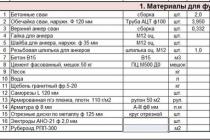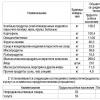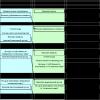At which the execution of the transaction occurs after a certain period of time from the moment the agreement is concluded. Urgent transactions are transactions that are settled within a period of more than two days.
Participants are divided into three large groups:
- Arbitrators– participants who receive due to the difference in asset prices on different trading floors. Arbitrageurs buy assets of the same type on several sites, due to which the value of these assets is balanced.
- Speculators is the largest group. Speculators use the futures market to profit by raising or lowering contract prices.
- Hedgers– participants who, with the help of derivatives exchange instruments, insure the main (underlying) assets. If the underlying asset turns out to be unsuccessful, part of the losses will be compensated by a deal made on the futures market.
What assets are traded on the derivatives market?
- Forward - an agreement under which one participant undertakes to sell at a set price after some time, and the other - to pay for the purchase. Such a transaction is beneficial for both participants: the buyer insures himself against a possible increase in the price of the asset and avoids storage costs, while the seller remains confident that the asset will be bought.
- – this tool is non-binding. An option gives the holder the right to buy an asset at a predetermined price, but if the option holder considers such a transaction uneconomical, he may choose not to enter into it. Then the option simply remains unexercised.
- – an agreement in which the parties agree in advance on the future price of an asset and the timing of delivery. There are several differences between a future and a forward: firstly, a forward is an over-the-counter instrument, so the parties can enter into a deal on any terms, while the terms of futures are standardized, and secondly, they are recalculated every day, so it is easier for an investor to predict how successful the deal will be. The forward profit will be known only at the time of the execution of the transaction.
- – a financial transaction involving the exchange of assets or payments between parties. For example, one party transfers fixed payments to the second, and the second party transfers floating payments to the first, the amount of which depends on the LIBOR rate.
What are the functions of the futures market?
The main functions of the derivatives market are:
- Insurance financial risks from the unfavorable economic situation ().
- Providing information to agents. The price formed in the futures market determines the future conjuncture.
- . Derivatives market provides extensive opportunities for speculative profit.
Why investors choose the derivatives market: the main advantages
 Investors prefer the derivatives market over the spot market for a number of reasons:
Investors prefer the derivatives market over the spot market for a number of reasons:
- Variety of assets. is able not only to conclude single transactions, but also to build a unique strategy based on combinations different types derivatives.
- Yield. The futures market is more profitable than the spot market. The investor can deposit only part of the funds as a guarantee.
- No transaction costs such as commission for the provision of credit resources and payment for the services of the depositary.
- . A number of derivatives market instruments are characterized by increased liquidity.
Is the modern derivatives market developing?
The following development trends are noted:
- Integration the latest technologies allowing you to execute transactions instantly.
- Liberalization is a reduction in the number of requirements for derivatives market participants.
- Expanding the range of financial instruments available for trading.
- The rapid increase in competition in the market.
Be aware of everyone important events United Traders - subscribe to our
Futures Market FORTS is a large Russian exchange segment, where various derivative financial instruments are traded in the Russian Federation and European countries. The date on which the future transaction will be executed, as well as the conditions for execution, are discussed during the conclusion of the contract. The Moscow Exchange acts as an intermediary and guarantor of the FORTS market.FORTS market, general information
The following assets act as instruments on the FORTS futures market:
- RTS and MICEX indices - price indicators Russian stock market;
- Volatility indicator;
- Industry indicators;
- Shares and bonds;
- Foreign currency;
- Commodities, oil, gold, industrial metals, etc.
To carry out transactions, it is necessary not to fully, but partially reserve funds for collateral trading position(warranty provision).
Why is trading on the FORTS market so attractive?
- A beginner in exchange trading has the opportunity to conduct exchange trading with the minimum amount Money on deposit (from 30 thousand rubles);
- The low guarantee collateral makes it possible to work with amounts of funds that are several times more amounts in the underlying asset market (spot market). That is, for the money spent on the spot market, you can buy more securities on the FORTS market;
- High liquidity ratio;
- Ease of implementation of trade activities;
- A large set of derivative management mechanisms makes it possible to diversify the portfolio, thereby successfully insuring investments and reducing risks. Today, FORTS has the largest selection of instruments in Russia, the most popular futures (shares, currencies, demanded goods) are traded here;
- Thanks to the presence of the evening trading session traders have the opportunity to carry out work in the evening, which coincides with the period of operation of the western sites, and thereby effectively monitor news changes.
The FORTS market enables sellers of real goods to insure price risks, that is, to significantly reduce them.
For example, a seller of diesel, fearing that the price of diesel fuel will decrease in the future, enters into a futures transaction for the purchase of the same product. At the same time, if the forecast comes true, losses in the real products market will be compensated by profits on the FORST platform.
Advantages and opportunities of trading on the futures market FORTS
Efficient operations on the FORTS market can bring higher profits than trading on the cash market:
- On the FORTS market, unlike the spot market, you can buy futures on the RTS and MICEX, which are Russian indicators;
- FORTS provides an opportunity to open "short" positions, that is, positions for sale (earnings from a decrease in the value of assets);
- Low costs due to low commission and the absence of depositary fees for the use of borrowed funds;
- The FORTS market is more speculative than the spot market;
- FORTS makes it possible to carry out transactions with large amounts, while the collateral can be only 5-20% of the total contract amount.
- Using leverage. Brokers give their clients the opportunity to make a transaction for an amount that exceeds the amount of deposit funds.
Derivatives market sections
Stock section of the futures and options market:
- Futures on RTS index. Provides a wide range of risk insurance options for the formation investment portfolio, as well as to make money on rising or falling prices. This tool can be used by both traders with a small amount on deposit and significant players.
- Futures on the MICEX index. The underlying asset of this instrument is an indicator of the MICEX index itself. Therefore, trading is a portfolio trading operation, which is conducted with all issuers included in the index. Such an investment is much more profitable than a separate purchase or sale of all elements included in the indicator structure. It's urgent and design view contract, so the delivery of securities included in the futures does not occur at the end of it.
- Stock futures. The underlying asset of this mechanism is represented by shares Russian enterprises various sectors of the economy: oil production, energy, metallurgy, communications.
Money section of the futures and options market:
Currency contracts are the most popular mechanism that attracts a wide range of investors. The circle of persons using this financial instrument, includes currency dealers managing stock portfolios, participants in the external economy, hedging risks. Through foreign exchange contracts, investors can protect their deposits from negative movements on money markets, as well as receive income from changes in the exchange rates of currency pairs.
Commodity section:
- Oil Ural and Brent;
- Precious metals;
- Copper and industrial metals;
- Sugar futures, etc.
Options
With the help of the FORTS market, stock market participants can take advantage of such an important financial mechanism as options on futures contracts. Such options are concluded not on shares, but on futures on shares. The underlying asset is represented by indices, shares of the largest Russian issuers, the US dollar, gold, silver, oil, etc.
Tools
 FORTS market futures
FORTS market futures
Futures regulates the purchase or sale at a specific time and at a predetermined price. The price and terms of the future transaction are negotiated in the process of concluding the contract. The exchange on which trading takes place develops standards that control futures transactions.
The list of such standards includes the method, time and place of delivery, and volume requirements are specified separately for a particular asset. At the conclusion of the contract, the seller and the buyer pay security deposit just in case one of them reneges on his obligations.
On the FORTS market, the following are used as assets:
- Currency pairs, including euro, ruble and dollar;
- Securities of large Russian enterprises;
- RTS indices;
- Oil, precious metals, sugar, electricity, diesel.
One of the main features of futures in the derivatives market, unlike the spot market, is the existence of an expiration date, after which the following events occur:
- Expiration (execution) of the futures, on the date of which the exchange calculates the profit / loss on the transaction and credits / writes off to / from the participant's account. After that, the futures itself will disappear from the account, and the participant remains without a position;
- Until the moment of execution, the value of the asset may change in an unfavorable direction for the participant, there will be a complete write-off of funds from the deposit. In this case, the exchange will require a deposit to maintain the position. If the account is not replenished, the exchange sells the futures at a loss to its owner, leaving him without a position and resetting the account.
FORTS market options
Option- this is one of the financial instruments that secures the right of a bidder to purchase or sell a certain product on a specified date and at a specified price.
It is worth noting that we are talking not about obligations, but about rights. Therefore, if the forecast of an increase in the value of a particular asset is not justified, the investor has the right to refuse to purchase it. Option transaction costs include only the amount of the premium paid to the option seller, but the income from such transactions is unlimited.
Options allow the investor not only to receive income from price fluctuations, but also to insure price risks. The risks here are assumed by the seller, who takes the obligation to sell or buy the asset at the performer's price.
The options market has the following features:
- Trading costs are significantly lower than in the stock market;
- Options can be used both by participants with a small amount on deposit and by large investors;
- Possibility of non-cash settlements for targeted transactions;
- Formation of a number of financial strategies;
- High leverage;
- Unlimited profit with reduced risks;
- The most optimal and convenient risk reduction mechanism.
How to start trading on the derivatives market of the Moscow Exchange?
The Moscow Interbank Currency Exchange (MICEX) is the largest stock exchange Russian Federation, CIS, Eastern and Western Europe.
The main advantages of the exchange:
- High level of liquidity. The daily trading volume is over $1 billion;
- Large selection of issuers (more than 1000 corporations);
- Publicity of issuers.
Any FORTS market participant can trade from their own terminal using various systems online trading, as well as from terminals provided by the Moscow Exchange.
To become a participant in the derivatives market of the Moscow Exchange, you must go through the following steps:
- Decide on a broker licensed to carry out brokerage activities, register with him and open a demo account;
- Download trading terminal and trade with virtual funds. At this stage, the broker provides the newcomer technical support, helps to learn how to work with the terminal, build charts, install indicators, learn how to make deals;
- Choose trading strategy and test it on a demo account;
- Open a real account with a broker working with the Moscow Exchange and conclude a service agreement with him;
- Start trading with real money.
Thus, the FORTS derivatives market makes it possible to carry out successful and profitable transactions for buying and selling futures and options. Both real commodity units (sugar or oil) and various financial instruments can be used as an asset. To date, the FORTS market is one of the most effective mechanisms for exchange trading, which allows you to earn income with minimal risks and costs.
In the modern interior and foreign economy an important role is played by the exchange of derivative financial instruments, which are traded on the derivatives market. Such components of financial markets are, in fact, the main sectors where the pricing of different types assets, and all risks are correctly redistributed among all its participants.
Simply put, the futures market is a specific trading platform, which is necessary for trading participants to sell derivative financial instruments. At the same time, the price for these instruments is formed depending on such indicators as the price of shares or goods, changes in indices, and so on. That is, transactions on futures exchanges are made quite quickly and within a predetermined period of time. certain period. Thus, in fact, the futures market involves trading non-existing assets, namely derivatives, the value of which depends on the value of real, underlying assets.
Currently, the main participants in derivatives markets are three main groups:
1. These are arbitrageurs who derive their profit from the difference in price on various trading floors of the derivatives market. This category bidders are interested in the final result of the auction, and not in itself the final profit. They buy the same types of assets on several platforms at once, which ultimately leads to the subsequent balancing of the value of assets on various trading platforms.
2. The main part of the derivatives exchange participants are speculators who use the instruments of the derivatives market to directly obtain high profits. Moreover, they extract their profit (well, or receive losses) due to the difference in the value of contracts and assets. This group of market participants is always liquid, and it consciously assumes all the risks associated with the possibility of price changes in one direction or another.

3. And last group– hedgers who use derivatives exchange instruments for their insurance when trading real (underlying) assets. Simply put, in the event that the transaction does not materialize and the price of a real asset starts to fall, everything is compensated by the profit received from alternative deal on the futures exchange or, alternatively, from the sale of shares on the stock market.
The most common types of derivatives market financial instruments
On the derivatives exchange, it is customary to carry out transactions with the conclusion of futures contracts, which are derivatives market instruments. Moreover, the most popular among bidders are considered to be such urgent instruments market like:
1. Forwards, or, in other words, forward contracts. Such an instrument is a term agreement, the conclusion of which is carried out, most often, outside the market itself.
The purpose of concluding a forward contract is the further real sale of the underlying asset at a price that is agreed between the parties in advance. By this agreement, one party undertakes an obligation on a predetermined subsequent day to provide, and the other party to immediately pay on the same day, a certain asset at a contractual rate. Therefore, by concluding a forward agreement, one party prematurely insures itself against an unexpected increase in the price of assets, and the other insures itself against a decrease in the price of the same asset.
2. Such an instrument as an option is a contract according to which the party to the agreement (either the seller or the buyer) receives the right, and not the obligation, to buy and sell one or another type of asset at a pre-agreed price and within a predetermined period of time soon.
3. And one more financial instrument of the derivatives exchange, no less popular among bidders, is called a futures contract, or a futures contract. This is such an agreement, as a result of which the acquisition or sale of real assets is carried out. When concluding a futures agreement, its parties agree in advance only on what the price for the asset will be and on the specific terms of its delivery. Simply put, the parties enter into an agreement on the transaction, with the calculation of the value of the asset at the present time, while the transaction itself will be concluded a little later, within the terms that are agreed in advance in the contract.
I wonder how the markets will be affected by the fact that the UK will leave the European Union in the future? What can we expect from such an event? Any ideas?
The forts market is one of the areas of the Moscow Exchange where futures and options are traded. When trading, underlying assets are taken into account - oil, stocks, etc. You can't get there unless you're Mishka Prokhorov...
Who knows what about the “Forts Derivatives Market of the Moscow Exchange”? I want to fit in there, I collect information. There are almost no reviews for this market.
Here you write about options, but is it true that options are available only on two exchanges located in the USA? That access to them is open only to citizens of the United States? I just read about it on the internet...
What exchange are you talking about? Buy 100 dollars in the bank, and then when he grows up to sell? Dear Vadim, people from the street are not allowed to enter a real stock exchange or market.
Today we will talk about some features of the derivatives market of the Moscow Exchange - FORTS and its advantages over Forex. And for starters, let's look at what FORTS is - it stands for "Futures and Options of the Russian Trading System” and provides a huge range of opportunities for hedging risks and conducting highly profitable speculative transactions with futures contracts.
FORTS Derivatives Market Instruments
On this market, futures are traded on the following assets:
Currencies (futures on the exchange rate currency pairs EUR/USD, USD/RUB, EUR/RUB);
Shares of leading Russian companies;
Bonds (government bonds, Eurobonds of the Russian Federation, etc.);
RTS index;
Goods for oil, precious metals, granulated sugar, diesel fuel.
In order to get into this market, you need to find a reliable broker (read the article ""), through which you will enter the Moscow Exchange. Where the auction takes place. Many people think that trading on the FORTS derivatives market requires a lot of money. But they are mistaken 🙂 An amount of only 5-6 thousand rubles is enough and it will already be possible to trade (1 contract) futures for Sberbank, Euro-dollar, Gazprom (I have listed some of the most liquid ones).
You can start with a smaller amount. One of the most expensive instruments is RTS index. Here a larger amount is already needed, about 30 thousand rubles. But I would not advise beginners to trade on it - the index is very liquid, often very noisy and there are a lot of major players. And now let's talk about the main advantages of the FORTS market over the Forex market.
Firstly, the FOREX market is very noisy and works out the levels worse (you will catch a lot of stops, if you put them of course 🙂. On FORTS, you can find smoother futures that hold levels well and are less noisy (the stops will be shorter). FORTS is regulated by law.Well, it's a plus for someone, a minus for someone.You have to pay a tax, but it's much more reliable.Another feature Forex market in that it offers huge leverage, which can sometimes be as high as 1:400. For a person who has just entered the market and decided to trade with such a leverage, this is a guaranteed loss. Therefore, if you still decide to start with Forex, then do not use leverage. Although, after a couple of draining days, the temptation to take a risk and enter a trade with all the leverage will be great 🙂. But it's better not to. In general, I would advise all beginners to start their acquaintance with trading from the Forts market. You can also go under my guidance. Good luck with your trading.
PS. For more information about the advantages and disadvantages of trading on the Forts market and the stock market, see the video.
Good afternoon, dear reader. On the pages of our website, we have already spoken more than once about the Moscow Interbank currency exchange MICEX (MOEX), its features, tools and conditions for working with it. But they did not touch upon the topic of the MICEX work schedule and the hours when trading is held on the stock exchange.
Let's take a look at the exchange's hours of operation and determine the best times to trade there.
As you probably know, the Moscow Exchange is one of the largest stock exchanges in the world, one of the twenty leaders in terms of the volume of trading and operations. Here you can work with securities the largest world and Russian companies, trading them and investing in them in order to receive dividends.
Opening hours of the MICEX stock market
The stock market of the Moscow Exchange includes several major sectors , each of which has a different operating time. Let's dwell on each of them in more detail.
MICEX main market
The base platform for investing in Russian and foreign assets, available to both residents of the country and foreigners.
The work of the MICEX in this sector is possible in several modes:
1. Addressless and anonymous deals (main trades) in T+2 mode.
Т+2 – the mode of concluding transactions with full payment and depositing funds two hours after the conclusion of the transaction.
Main trading hours:

2. Mode of Negotiated Deals (NTP)
3. REPO transactions

4. Trading of incomplete lots: 16.00 – 18.45
Sector Standart
Allows you to work not only with stocks, but also with options, futures, shares, etc. Provides for trading mode T + 4.
Opening hours:
Main session: 10.00-18.45
Evening session: 19.00-23.50
Classic sector
Allows you to independently set the date and method of settlements, as well as make them in foreign currency. Opening hours coincide with the main session.
Derivatives market MICEX
Market for futures and options contracts. The most demanded assets: RTS index, world currencies, gold, oil, raw materials.
MICEX schedule on the derivatives market: 10.00-23.50.
Summary table of the MICEX mode of operation:

Additional information regarding the trading time on the Moscow Exchange is in the article "".
Sincerely, Nikita Mikhailov














